
Improving islands capacities to develop bankable renewable energy projects
Member countries and observer institutions met during the IRENA 8th Assembly in 2018 to identify the best options for IRENA to facilitate the development of renewable energy projects in Small Island Developing States (SIDS).
Overcoming renewable energy deployment challenges in islands
Small island stakeholders gathered to better understand the main incentives for developing renewable energy projects, clarify needs in terms of capacity building to develop bankable renewable energy projects and generate ideas on how IRENA’s project facilitation platforms can further accelerate the development of renewable energy projects in SIDS.
Together with the IRENA secretariat, panelists and member countries discussed the use of IRENA’s project facilitation platforms and other programmes in place by SIDS, identified key stakeholders and potential partners for the execution of IRENA’s project facilitation activities, highlighted achievements under the SIDS Lighthouses Initiative, and presented current and planned activities supporting renewable energy deployment in SIDS.
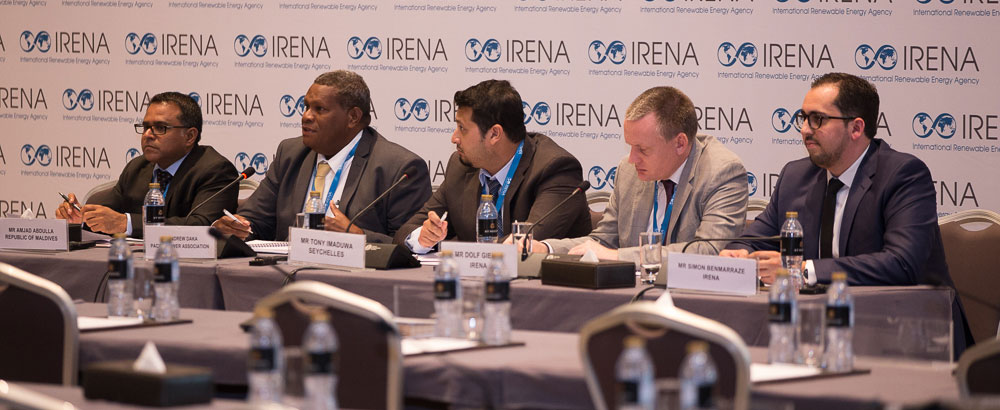
In his opening remarks, Dolf Gielen, Director of the IRENA Innovation and Technology Centre, highlighted the challenges faced by SIDS in the deployment of renewable energy such as geographical constraints, resource availability, market size, sensitive ecosystems, and lack of economies of scale. He presented the SIDS Lighthouses Initiative, which brings islands and partners together to support all operational steps in the energy transition such as the SIDS Lighthouses Quickscan, the Project Navigator, the Sustainable Energy Marketplace and the Global Atlas for Renewable Energy.
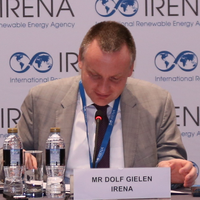
Dolf Gielen
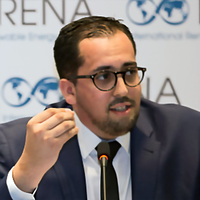
Simon Benmarraze
Simon Benmarraze, Analyst at the IRENA Innovation and Technology Centre indicated that renewable energy projects face challenges on institutional, policy, regulatory, market and project levels. Mr. Benmarraze showcased the suite of project facilitation platforms developed by IRENA to address those challenges and bridge project development and financing gaps in SIDS. He mentioned that several capacity building workshops based on the Project Navigator will be organized for project developers in the Caribbean, Africa, Indian Ocean, Mediterranean, South China Sea (AIMS), and Pacific regions.
IRENA Project facilitation platforms
IRENA, through the SIDS Lighthouses Initiative, provides a suite of project facilitation platforms to address island specific challenges and bridge project development and financing gaps in SIDS.
The International Renewable Energy Agency and the Abu Dhabi Fund for Development have collaborated on a joint Project Facility to support replicable, scalable and potentially transformative renewable energy projects in developing countries. ADFD committed USD 350 million in concessional loans, over seven annual funding cycles, to renewable energy projects recommended by IRENA.
MoreThe IRENA Global Atlas is an online geographic information platform designed to provide resource assessment and mapping data covering solar, wind, bioenergy, geothermal and marine energy. The web platform allows to find maps of renewable energy resources for locations across the world. The initiative, coordinated by IRENA is aimed at closing the gap between countries that have access to the necessary data and expertise to evaluate the potential for renewable energy deployment in their countries and those that lack these elements.
MoreThe Sustainable Energy Marketplace is a virtual marketplace connecting renewable energy project owners, financiers/investors, services providers and technology suppliers. It aims to scale up investments – both public and private - in renewable energy and energy efficiency in developing countries and emerging countries to meet global climate and sustainable development goals.
MoreProject facilitation discussion with small island stakeholders
The meeting gathered stakeholders from several Small Island countries and regions and invited them to provide remarks on their specific energy context identifying challenges for the development and financing of new renewable energy projects and commenting on the level of coordination among various local, national, bilateral, and international agencies.
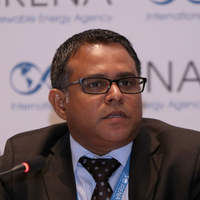
Amjad Abdulla
Director General, Ministry of Environment and Energy, Republic of Maldives
Amjad Abdulla stressed the fact that renewable projects in small islands cannot be appraised only in financial perspective because they frequently contribute to broader decarbonisation efforts and support the increased resilience of SIDS to the impacts of climate change, including extreme weather events and rising sea levels. He commended on role of IRENA as a catalyst for capacity building, facilitating bundling efforts and triggering engagement from local and international players and cited the work of the Initiative for Renewable Island Energy (IRIE), a facility founded by the Alliance of Small Island States (AOSIS) and IRENA to support SIDS in implementing renewable energy and energy efficiency aspects of SIDS Nationally Determined Contributions and to mobilize technological, financial, and human resources needed by SIDS to achieve rapid renewable energy adoption.
Mr. Abdulla observed that some islands in the Maldives are densely populated and space for renewable energy deployment could be lacking as roofs suitable for residential PV applications are already being used for different purposes. He stressed the need for more innovative solutions and cautioned about excess bureaucracy in land allocation.
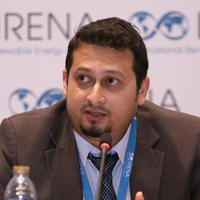
Tony Imaduwa
Chief Executive Officer, Seychelles Energy Commission, Republic of Seychelles
Tony Imaduwa pointed out that IRENA and the SIDS Lighthouse initiative are addressing the right challenges faced by SIDS, which are still highly dependent on fossil fuel imports. He noted that current fossil fuel market volatility is negatively affecting the Republic of Seychelles. Working with IRENA is seen as an essential step in the transition to a renewable energy-based society. In addition to the traditional SIDS challenges, Mr. Imaduwa mentioned grid integration issues that currently limit the scale-up of early pilot projects. He also observed that training efforts need to be intensified, pointed out that utilities play a key role in the deployment of renewable energy in islands and mentioned that investment decisions should include the local governments as they are usually the ones to provide sovereign guarantees which have an important in the nation's economic budget.
Mr. Imaduwa noted that creating the right environment for renewable energy will catalyze the deployment of projects. Mr. Imaduwa emphasized on the limited human capacity and the dependence on partner expertise which brings projects to SIDS but generally provides limited contribution to the development of local capabilities.
Andrew Daka, Executive Director of the Pacific Power Association highlighted that similar challenges are faced across many Pacific states such as availability of financing for projects, limited knowledge on locally available RE and limited local capacity available to take a renewable energy project from a concept to implementation. Mr. Daka stressed the need for increased technical capacity to operate and maintain renewable energy systems already in place and cited the engagement of the private sector as an important enabling factor for the Pacific region. Another issue brought up was that most project development activities are frequently implemented by international partners with limited local input. He therefore recommended to implement frameworks and activities that enable more local stakeholder involvement in a way to allow them to acquire the necessary knowledge and know-how required to develop and operate projects.
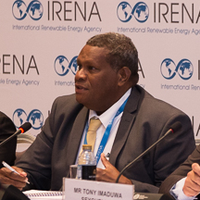
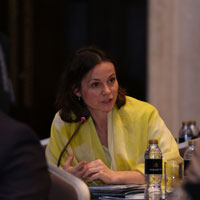
From the audience, Vera Rodenhoff, head of Division of International Affairs at the German Federal Ministry for the Environment, Nature Conservation Building and Nuclear Safety (BMUB), expressed her satisfaction for being able to contribute to the Lighthouses and IRENA’s project facilitation initiatives and for the cooperation between IRIE and IRENA. She pointed out that ocean energy and energy storage technologies are relevant topics for islands which should be developed further. Creating economies of scale is important and therefore regional cooperation and cooperation with other institutions is paramount. She noted that the German's "International Climate Initiative (IKI)" financing instrument of the Federal Ministry for the Environment, Nature Conservation, Building and Nuclear Safety (BMUB) will open a new tender for project preparation in the future.
Also from the audience, Vince Henderson, Chairman of the Executive Council of SIDS-DOCK, an initiative designed to provide SIDS with a collective institutional mechanism to assist them in transforming their national energy sectors into a catalyst for sustainable economic development and help generate financial resources to address adaptation to climate change, commended the panellists, moderator and IRENA for its project facilitation initiatives, namely Project Navigator, Global Atlas and Sustainable Energy Marketplace, noting that these tools are very useful for SIDS stakeholders. He pointed out that SIDS transition to renewables is not only about reducing greenhouse gas emissions, it is about cost reduction and energy security. He urged IRENA to engage the private sector with its project facilitation tools, since they are an integral part of the transition of SIDS to a renewable energy future.
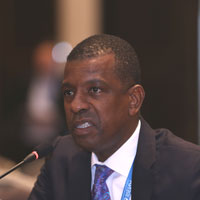
Key takeaways
The side-event of the 8th IRENA Assembly on improving SIDS capacities to deliver bankable renewable energy projects highlighted the need to refine the concept of bankability of renewable energy projects in islands to account for positive non-financial externalities. It also stressed the need for more project bundling and standardization with panelists and audience contributions centered around the following points: